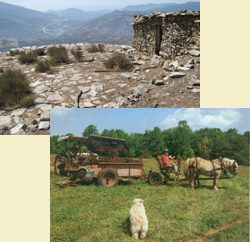Core Ideas
Energy and Sustainability in Late Modern Society
Thursday, July 9th, 2020Near the end of the modern age, sustainability assessment of the economic activities of modern society has encountered two problems, one physical, the other cultural. The discovery of a dense, high quality energy source had led to an explosion of human use of the planet’s raw materials and facilitated invention of new technologies, which in [...]
Human designs for ecosystem management and survival after the oil era
Saturday, January 18th, 2020All societies in history have relied on the land and its plant and animal resources. The superstructure of high technologies and complex forms of social organization like cities that fossil energy has made possible only conceal our essential reliance on the land. As access to the dense, high quality forms of energy in fossil fuels [...]
The Industrial Economy is Ending Forever: an Energy Explanation for Agriculturists and Everyone
Saturday, March 30th, 2019Nothing happens without energy. Howard T. Odum created a framework of energy flow, conversion, storages and feedback that built systems ecology into a general systems theory. That provided ecosystem science with a rigorous disciplinary basis. Odum and his intellectual progeny see that understanding how energy makes everything happen is so important, not only for the [...]
Why Systems Thinking?
Thursday, January 23rd, 2014My explicit focus on systems thinking in writing and teaching comes from an awareness, spreading slowly through the knowledge business, that it is an essential approach to all inquiry intended for application to real world problems. For its importance to be taken seriously and applied to all important issues in everyday life, systems thinking needs [...]
Three Farmhouses: A Study in Passive Solar Design
Wednesday, August 21st, 2013I have just added this account of my experiences in energy-efficient housing design and construction to my Core Papers on this website. It is an attempt to fill a gap in the literature of low energy design that, in view of the long-term energy crisis that the world is entering, I see as a serious [...]
Reductionist Science and the Rise of Capitalism: Implications for a New Educational Program of Agricultural Science
Wednesday, January 4th, 2012The thesis of this essay is that there is a way of doing science that is characteristic of scientific inquiry under capitalism because its methods provide the kind of “irresponsible knowledge” that a profit-at-whatever-cost social system like capitalism requires. As my title implies, I will argue that as capitalism evolved to become an ever more [...]
Visioning County Food Production – Part Five
Sunday, October 24th, 2010Part Five: Peri-urban Agriculture
This series of articles is an exploration of designs for agriculture in Tompkins County to approach sustainability in a future of declining access to the cheap energy and other inputs on which our industrialized food system relies. In earlier parts of this series, I proposed principles of agroecosystem design; addressed the [...]
Visioning County Food Production – Part Six
Tuesday, August 10th, 2010Part Six: Rural Agriculture
This series of articles is an exploration of designs for agriculture in Tompkins County to approach sustainability in a future of declining access to the cheap energy and other inputs on which our industrialized food system relies. In earlier parts of this series, I proposed principles of agroecosystem design; addressed the key [...]
Invisible Ships and Boiling Frogs: The End of Industrial Affluence
Monday, June 7th, 2010It is said that when the ships of the Old World first approached the New World, they were sometimes invisible to the indigenous people of the Americas because the latter could not imagine such a thing as a fleet of large sailing ships, and simply did not believe their eyes.
In the same way, when a [...]
Visioning County Food Production – Part Four
Monday, April 19th, 2010Urban Agriculture
This series of articles is an exploration of designs for agriculture in Tompkins County to approach sustainability in a future of declining access to the cheap energy and other inputs on which our industrialized food system relies. In earlier parts of this series, I proposed principles of agroecosystem design, addressed the key [...]
« Previous Entries